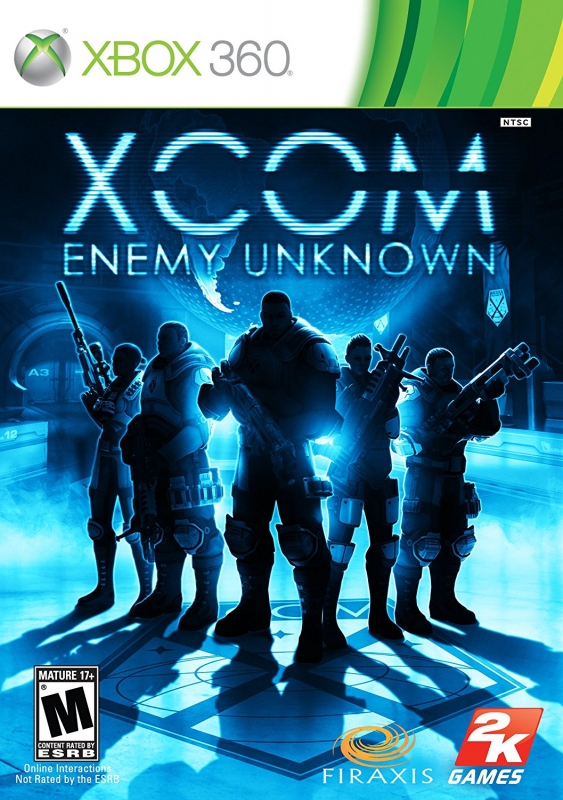
XCOM: Enemy Unknown (X360) - Review
by Jake Weston , posted on 08 November 2012 / 5,462 Views2012 has proven to be an excellent year for storytelling in video games. Mass Effect 3 and Assassin’s Creed III gave the stunning (though controversial) conclusions to epic series, Max Payne 3 and Halo 4 saw the return of gaming’s most beloved icons, and titles like Journey, Spec Ops: The Line and The Walking Dead have pushed what the medium is capable of. However, when I look back on the titles of 2012, there will be one game that I will remember most fondly for its narrative experience, and that game is XCOM: Enemy Unknown. Now, you may be asking, why would Enemy Unknown, a remake of 1994’s X-COM: UFO Defense with only the lightest of storytelling elements have my favorite narrative of 2012?
Because I crafted the narrative myself.
Make no mistake, XCOM: Enemy Unknown has the basic elements of a story already in place. In the year 2015, aliens have begun a secret invasion of Earth. As the commander of the newly put together XCOM force to thwart the invasion, you’re in charge of managing your base, procuring funds, researching weapons, and commanding your squad. While XCOM’s basic story beats are standard and unremarkable, the game truly stands out by giving you the tools to create your own narrative. XCOM does not achieve this with a binary choice system or dialogue trees, however. Instead, it uses the game’s mechanics to give you the tools to write your own story.
This is achieved two-fold. First, with the base management system. Firaxis is well known for their simulation games, with their work on the Pirates! and Civilization franchises, and their mastery of the genre carries over here. As the commander of the XCOM UFO Defense Force, you are tasked with recruiting soldiers, scientists and engineers to aid you in the resistance, while keeping the nations of the world happy so that you can procure more funding. This sounds easy on paper, but early on you’ll find out that the game forces you to make tough choices. Do you send your squad into Australia to lower the country’s panic level, or send them to England to save more engineers (and thus procure essential funds)? Neglect a nation long enough, and they’ll pull out of the XCOM program, leaving your game permanently. Without a single line of dialogue or emotional music, drama is created.
Firaxis’ penchant for simulation is flawlessly executed in XCOM’s base management, but the real meat-and-potatoes of the game is the tactical turn-based combat. Just like classic X-COM: UFO Defense, battles are carried out in turns, moving your squad mates one at a time, and the alien forces then get a turn to do the same. There have been a few new changes from the original X-COM, however. Squad size has been reduced from eight to six, but in its place are new squad classes -- heavies, who can lay down suppressing fire and wield rocket launchers; assault, who can carry either machine guns or shotguns and shoot and can move more distance before shooting; snipers, who can dominate the battlefield with their huge range and accuracy; and support, who excel at healing teammates and laying down covering smoke. Though X-COM die-hards may be disappointed at the decreased squad size, the new classes add a whole new layer of strategy to the game.
A new cover system also adds strategic depth. You can place your team members up against any wall or similar structure to put them in cover, decreasing their chances of being hit or removing them from enemies’ sight altogether. Optimizing your squad coverage ends up being the difference between life and death in XCOM.
Death is where most of XCOM’s dramatic tension lies. Like the original UFO Defense, as well as other strategy games such as Fire Emblem and Valkyria Chronicles, death of your squadmates is permanent, leading to a greater emotional attachment than games in which a reload is all that stands between you and immortality. You’ll grow attached to each and every one of your squadmates, to whom the game even gives specialized nicknames after enough battles. Losing your most decorated sniper is heartbreaking not only because of the detriment to the war effort, but because you felt an emotional connection to them. Sure, you can just reload a save whenever things go wrong, but all you’re doing is robbing yourself of dramatic weight.
Though the tactical gameplay offered by XCOM nears perfection, there are a few qualms you may have that will start to annoy over time. The hit percentages seem to be far less accurate than the game lets on. Missing four times in a row with an 80% chance to hit just doesn’t seem right. Enemies also get what essentially amounts to a free move once they enter your line of sight. Sure, it adds more tension and requires more tactical thinking, but it gives an unfair advantage to an opponent that already has so many advantages over you. Minor visual quirks, such as soldiers shooting through walls or teammates, or shooting in the entirely wrong direction, also take you out of the experience somewhat.
When the XCOM first-person shooter reboot was announced in 2010, long time fans were disappointed in the new visual style that abandoned the original anime-inspired aesthetics of the series in favor of a more stylized, ‘50s feel. XCOM: Enemy Unknown offers a perfect blend of both styles, resulting in an art desgin that evokes the series tradition while still updating it for a modern audience. Alien designs, from the classic gray Sectoids to the conspiracy-laden Thin Men mesh well with the more terrifying Mutons and Chrysalids. The game is far from a visual powerhouse, but the simplistic art style goes a long way in making it look great.
XCOM: Enemy Unknown should be the picture that shows up under the word “reboot” in future dictionaries; it is the pinnacle of everything right with the practice. Enemy Unknown takes everything that defined the franchise and expands upon it while streamlining it for a mainstream audience. Its tactical, risk-versus-reward gameplay is engrossingly addicting, and provides a wonderful context in which to grow attached to your characters and the fate of the human race. XCOM: Enemy Unknown has breathed new life into the series, and has reinvigorated the tactical-strategy genre.
This review is based on an Xbox 360 copy of XCOM: Enemy Unknown.
VGChartz Verdict
9
Outstanding


























 Essay Pro
Essay Pro